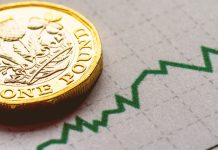- Pound (GBP) falls after retail sales fall
- UK consumer confidence drops
- Euro (EUR) rises despite fall German PPI
- ECB’s Elizabeth McCaul is due to speak
The Pound Euro (GBP/EUR) exchange rate is falling for a second day. The pair fell -0.4% in the previous session, settling on Thursday at €1.1470 and trading in a range between €1.1469 – €1.1532. At 07:35 UTC, GBP/EUR trades -0.12% at €1.1456.
The pound is falling across the board after plunging consumer confidence and weaker-than-expected UK retail sales.
Retail sales dropped 0.9% month on month in September after rising 0.4% in August; expectations had been for a 0.1% drop.
This is just the latest data which adds evidence towards a weakening economy. Figures earlier this week showed that wage growth eased, unemployment rose, and consumer confidence fell.
Data week also showed that UK inflation remained sticky in September. However, the weak retail sales data could encourage Bank of England policymakers to believe that the 14 straight interest rate hikes are starting to slow demand and cool inflationary forces.
The Bank of England will meet on the 2nd of November to decide whether to raise interest rates again. The market expects the central bank to keep interest rates unchanged at 5.25%, the highest level since 2008.
However, recent speeches from Bank of England policymakers have shown how divided the Monetary Policy Committee is. Some policymakers are concerned that wage growth, which is still near record highs, is inconsistent with inflation cooling to 2%. Meanwhile, other policymakers are concerned that given the lag time between rate hikes and the impact on the real economy, much of the impact of the 14 rate hikes still hasn’t been felt.
The euro is pushing higher despite German wholesale inflation falling more than expected in September. PPI, which measures inflation at the factory gate level, fell -14.7% year on year in September after falling -12.6% in August. On a monthly basis, PPI fell 0.2%, defying expectations of an increase by 0.4%. A weak producer price index points to a weak demand environment, which raises concerns over that. Outlook for the German economy.
Looking ahead, there is no more eurozone economic data for investors to digest. Instead, attention will be on ECB executive board member Elizabeth McCaul, who was due to speak.




